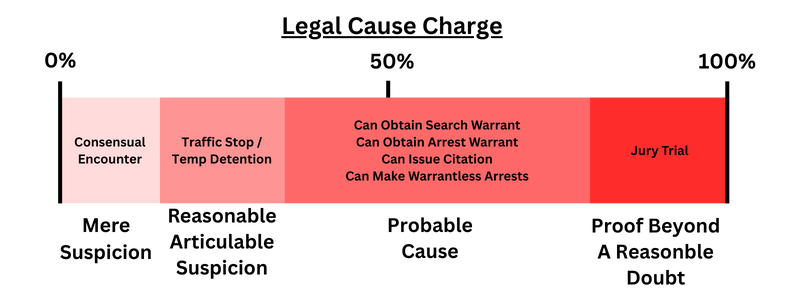Understanding Probable Cause: Your Rights and Defense in Florida
Published on by Jeff Lotter
"Probable cause" is a term you might hear frequently in relation to criminal law, but what does it truly mean, and how does it affect your rights? As a cornerstone of the American justice system, protected by the Fourth Amendment, understanding probable cause is crucial if you're facing criminal charges in Florida.

What Exactly is Probable Cause?
At its core, probable cause is the legal standard law enforcement must meet before they can lawfully arrest you, search your property, or obtain a warrant from a judge. It's not merely a hunch or a gut feeling; it demands a reasonable basis, supported by specific, articulable facts and circumstances.
This means an officer must possess sufficient information to lead a reasonable person to believe that:
- A crime has been, is currently being, or is about to be committed.
- The specific individual they intend to arrest is the one who committed that crime.
- The place they intend to search (with a warrant) contains evidence related to the crime.
Courts often describe this standard as a "fair probability" or a "substantial chance" – a level of certainty that rises above bare suspicion but falls short of the evidence needed for a conviction at trial. The determination of probable cause is always based on the "totality of the circumstances" known to the officer at the specific time of the action (arrest or search).
Jeff Lotter's unique experience as a former police academy instructor, where he taught the principles of probable cause, gives our firm an unparalleled edge in analyzing its application in our clients' cases.
Probable Cause vs. Reasonable Suspicion: A Key Distinction
It’s vital to differentiate probable cause from a lower legal standard: "reasonable suspicion." While both allow for certain law enforcement actions, they are not interchangeable and have different implications for your rights.
Reasonable Suspicion
This standard allows police to briefly detain someone (like in a traffic stop or a "Terry stop") if they have specific facts suggesting criminal activity might be occurring. It’s more than a hunch but less than probable cause. It might permit a limited pat-down for weapons if officer safety is a concern, but it's generally not enough for an arrest or a full search.
Probable Cause
This higher standard is required for more significant intrusions on your liberty, such as a lawful arrest, obtaining a search warrant, or (in most cases) searching a vehicle without a warrant. It's based on that "fair probability" that a crime occurred or evidence exists.
Challenging a Lack of Probable Cause: The Lotter Law Approach
If law enforcement acts without the necessary probable cause, your constitutional rights may have been violated. This is where a skilled defense attorney becomes indispensable. At Lotter Law, we meticulously examine every detail of your encounter with law enforcement, specifically looking for deficiencies in probable cause. Our strategies include:
- Scrutinizing the Arrest: We analyze the officer's stated reasons for the arrest. Was it based on solid facts, or assumptions and weak inferences?
- Examining Search Warrants: If a warrant was issued, was the affidavit supporting it factually sufficient and reliable? Did it particularly describe what was to be searched and seized?
- Analyzing Warrantless Searches: While exceptions to the warrant requirement exist, they often still hinge on probable cause. We assess if the circumstances truly justified bypassing the warrant process.
- Filing Motions to Suppress: If we determine that evidence was obtained in violation of your Fourth Amendment rights (i.e., without probable cause), we will file a Motion to Suppress. This powerful legal tool asks the court to exclude that illegally obtained evidence from being used against you in court.
Our firm’s commitment to data-driven defense, including tracking case dispositions in Orange County, often reveals patterns in how probable cause is established (or fails to be established) in various scenarios, further strengthening our ability to advocate for you.
The Impact of a Successful Probable Cause Challenge
Successfully challenging an arrest or search based on a lack of probable cause can have a game-changing impact on your criminal case. Potential outcomes include:
- Evidence Suppression: The exclusion of critical evidence obtained illegally.
- Weakened Prosecution Case: Without key evidence, the state's ability to prove guilt diminishes significantly.
- Case Dismissal or Reduction of Charges: Often, the suppression of vital evidence leads to charges being dropped or reduced to lesser offenses.
- Increased Negotiation Leverage: A strong challenge to probable cause can significantly improve our position when negotiating with the prosecution for a favorable plea agreement.
Protect Your Rights with Experienced Counsel
If you believe your arrest or a search of your property in Florida was conducted without sufficient probable cause, it's imperative to seek legal counsel immediately. The complexities of Fourth Amendment law require an experienced attorney who understands how to dissect police procedure and hold the state to its burden of proof.
Contact Lotter Law today for a free and confidential consultation to discuss the specifics of your case and learn how we can fight to protect your rights.